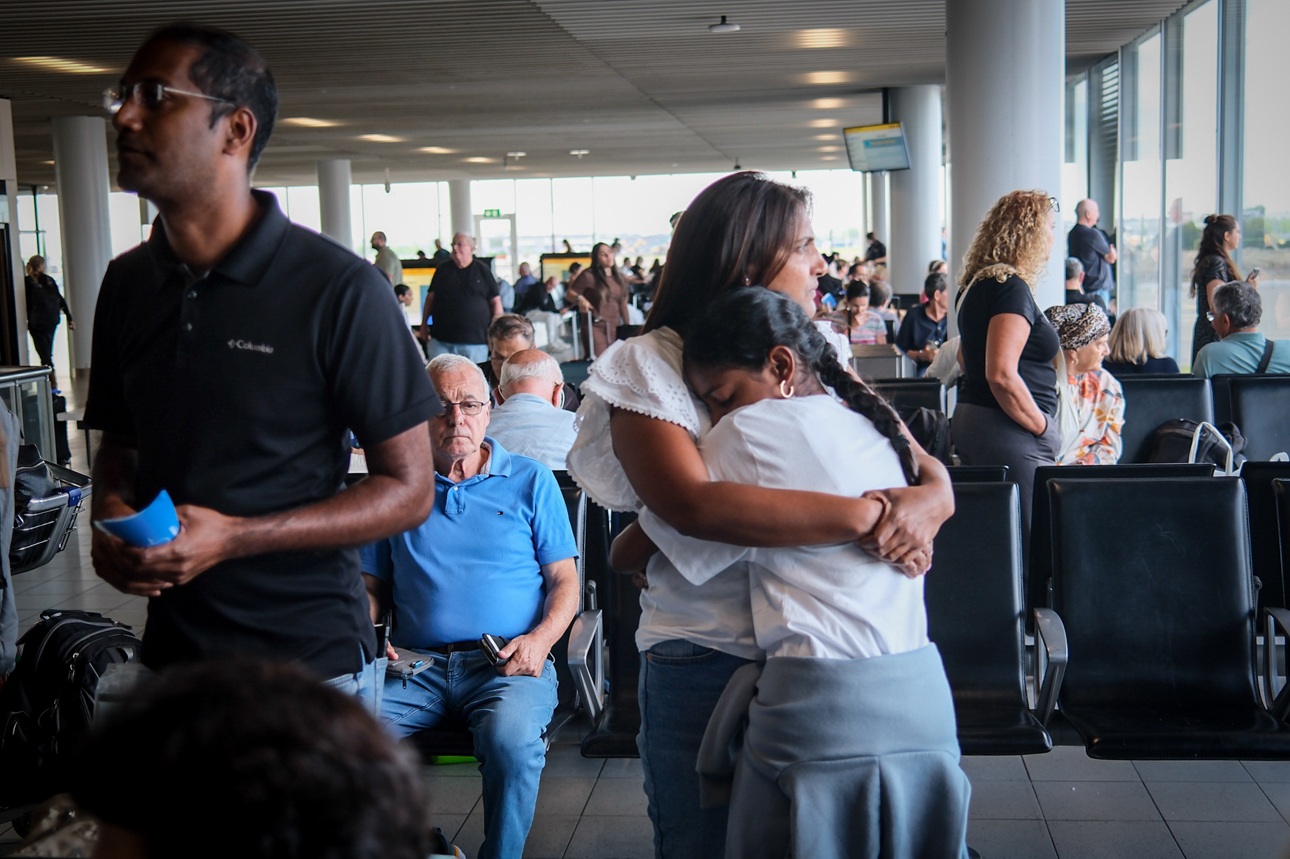A Lesson from the Iran War: Israeli Identity Crosses Borders
During Israel's twelve-day war with Iran, hundreds of thousands of Israelis found themselves stuck abroad. Partnerships emerged between Israeli civil society organizations and the diaspora community to help Israelis find housing, medicine, and other community-based solutions. This demonstrates the importance of Israeli investment in strengthening community ties between Israelis abroad and the State of Israel.

Photo by Dor Pazuelo/FLASH90
Early morning on June 13, people in Israel were jolted awake to the emergency alert sounds on their phones, as the IDF prepared the home front for an expected Iranian retaliation. Meanwhile, in countries around the world, 180,000 Israelis suddenly found themselves holding plane tickets—but with no flights to bring them home. While most Israelis on the ground were scrambling to find a secure shelter, Israeli communities around the world instantly became a lifeline for thousands of stranded travelers, providing housing solutions, medical assistance, and a sympathetic ear.
The sudden closure of the skies brought real distress to many Israels, who left children and families behind, were experiencing medical emergencies, left unattended businesses, or simply wished to be close to home in a time of crisis. Abroad, as in Israel, solutions often emerge from civil society—and in this case, multiple boundaries were transcended.
In the U.S., the operation was led by the IAC (Israeli-American Council) through its “Brothers Across the Sea” initiative. The organization set up an operations center that connected Israelis not only to host homes, medical assistance, and Hebrew-speaking support—it also became a bridge to the American-Jewish community, which rose to the challenge. Hundreds of Israeli families contacted the operations center over the course of the war, most of them seeking housing solutions. For every family that reached out, at least two local families were found willing to host them—most from within the American-Jewish community. This initiative was funded entirely through local donations, without any official support from Israel, and relied on Israeli volunteers who stepped in to connect Israeli families—many of whom had made their way to New York in the hope of finding a flight home—with local households.
In Europe too, organized Israeli communities became an anchor for Israelis left suspended between heaven and earth. The Israeli Community in Europe organization (ICE) established an operations center in Berlin that fielded hundreds of inquiries from London, Berlin, Barcelona, Athens, and other cities.
The key point here—and this is central—is that these initiatives were Israeli, but the partnerships were broad, and include the local Jewish communities.
It’s long been known that Israeli emigrants often struggle to integrate into Jewish communities abroad due to differences in language, customs, and culture. What we’re seeing now is that an organized Israeli community can be the most effective bridge to close those gaps and forge cross-border connections between the two groups—for the benefit of all. The local Israeli community has become an effective channel in conveying the immediate needs of Israelis to the Jewish community, and in connecting existing communal capacities with an initiative deeply rooted in a longstanding Jewish tradition of mutual aid. After October 7, many Jews around the world asked what they could do to help their brothers and sisters in Israel. The best and most immediate answer came from the Israelis they encountered around them.
Surveys conducted since October 7 speak for themselves: there has been a sharp rise in the desire of Israelis abroad to connect with other Israelis, out of a sense that only fellow Israelis can truly relate to their feelings and grasp what’s at stake—the longing, the anxiety, the uncertainty. At the same time, there is also a growing willingness to take part in organized Jewish frameworks, such as schools, community activities, and the like. The crisis we all experienced led many to seek out community, where they could both draw strength and offer it.
At the same time, while most countries around the world currently pursue foreign policy strategies aimed at directly strengthening ties with their national diasporas—recognizing the significant social, economic, and political value in doing so—Israel devotes very little funding or attention to its Israeli communities abroad.
There is a Gordian knot connecting Israel’s internal and external struggles to the experiences of Jewish communities around the world. Israelis in the diaspora stand precisely at this intersection—sharing in the pain and fear experienced in Israel on the one hand and encountering the challenges faced by minorities in foreign societies for the first time, on the other. The bridge created in a time of crisis demonstrates the importance of Israeli investment in strengthening community ties between Israelis abroad and the State of Israel, and the best way to forge bonds with longstanding Jewish communities.
We are in the midst of a long war, and its ripples will be with us for many years to come. In this process, as we keep repeating the phrase “Together we will win,” it’s worth remembering that this “together” does not end at Ben Gurion Airport.
